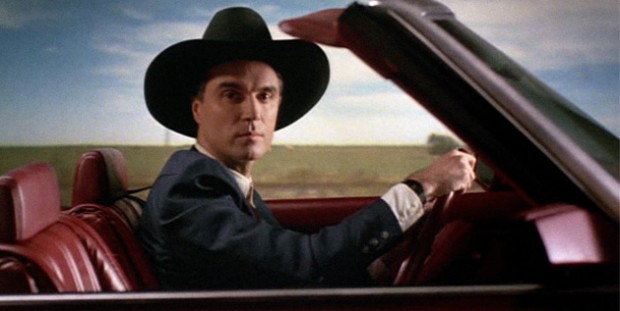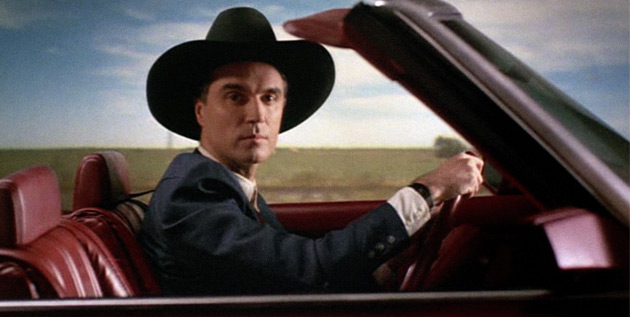
Restore This is a column in which we take a look at cult films begging for a special edition. These range from outrageous works of genre to the specialty arthouse. Either way, we hope to bring more attention in order to increase their availability and achieve the restoration they deserve.
Background/Reception
True Stories was the directorial debut — and, to date, only such effort — of David Byrne. While I can’t imagine a life where Byrne wasn’t familiar to myself, I guess there needs to be the obligatory explanation of who he is. As frontman of one of the most influential bands of the ’70s and ’80s, Talking Heads, he brought avant-garde influences (ranging from world music to Dadaism) to new-wave rock. He also, basically, invented sampling, a practice now extremely common in hip-hop, notably with Brian Eno on the 1981 album My Life in the Bush of Ghosts.
To those looking for a strong entry point to the artist, I recommend the 1984 Jonathan Demme-directed Talking Heads concert film, Stop Making Sense. Byrne’s marionette-like physical performance is not only as dynamic as his music, but instantly gives you the impression of why he was the distinct face of that band.
However, True Stories was an effort to make his voice heard in a new medium: branching from his experimentations with music videos (including the video-art inspired piece for Heads’ iconic “Once in a Lifetime”) to long-form storytelling. His inspiration, along with that of co-writers Beth Henley and Stephen Tobolowsky (yes, him) were true stories they came across in the newspaper. While the response was mostly positive, the film never had that indie breakthrough success like other offbeat American pictures of the 1980s (such as Stranger Than Paradise or Blue Velvet).
But What’s It About? (per IMDb)
A small but growing Texas town, filled with strange and musical characters, celebrates its sesquicentennial and converge on a local parade and talent show.
What I Thought
Being aware of the album released from the film of the same name (as well as the music videos for its singles) gives one a strange impression upon watching True Stories. When one sees their place within the body of the movie, it’s easy to realize how much the film, in a way, feels like a commercial of sorts.
The best example would be the “Wild Wild Life” sequence, a rapid-fire montage of different strange characters (many played by Talking Heads band members) trying their hand at a lip-synched karaoke. Watching it, along with other sequences in the film, seems to give the idea that it’s less an actual motion picture and more, again, a commercial for the group. But commercialism is an issue deeply embedded within the film, and extends to its appropriation of quick-cut television culture of the ’80s.
Throughout, our quirky characters of the fictional Virgil, Texas navigate their lives through the prisms of television screens and shopping malls — consumerism as a promise of emotional fulfillment. Because of Byrne’s status as an ultra-hip and arty rock star, his film runs the risk of coming off as elitist and condescending, but many of the the film’s musical sequences, such as the concluding “Celebration of Special-ness,” bear the strong mark of a celebratory melancholy.
What he seems to be saying is that expression is the ultimate form of escape, a universal sentiment that any artist could understand. While these people are informed by mainstream culture of both the current and past, their natural strangeness configures it into an earnest and emotional shape.
State of the DVD
True Stories has the unfortunate distinction of being released through WB’s first wave of DVDs. In short, that means it not only is packaged in a snapper case that’ll awkwardly fit between other titles in your collection, but also that the transfer was, simply, taken from the laserdisc.
Needless to say, this pan-and-scan copy was likely be acceptable on your non-widescreen television in 1998. Now? It’s not going to look so good. The studio has never bothered to remaster the film, likely due to its cult-yet-not-cult-breakthrough status, especially as it seems many younger Talking Heads fans aren’t even aware of its existence.
While Criterion is always the obvious answer for who should provide restoration, True Stories actually would be a choice in the vein of their recent release of Jonathan Demme’s Something Wild, another overlooked American comedy of the ’80s. To say nothing of the otherwise-obvious connection.
Of course, a large coup for some potential look-back documentary would be getting the participation of the other Talking Heads members (Tina Weymouth, Chris Frantz, Jerry Harrison) who’ve been on poor terms with Byrne since the disassembly of the band in the early ’90s.
Are you a fan of True Stories? Do you agree it’s begging for an update?

